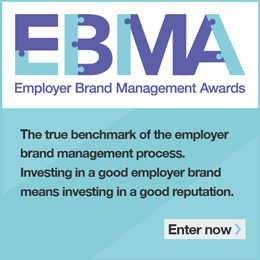Opinion: "Employer vs. corporate brand"

As more and more companies begin to implement employer brand management strategies, Diccon Ward asks, how does the employer brand relate to the wider corporate brand?
Since the phrase ‘employer brand’ was coined by Simon Barrow some years ago, much has been written on the topic. I have worked in branding for more years than I care to remember, in that time, there is no doubt that the employer brand has moved from a conceptual idea to a movement with such momentum that it is now central to most switched-on organisations.
At Arcadis, we are fortunate to work for and with some of the world’s biggest brands, helping to define and deliver their brand experiences to both customers and to employees. It is encouraging to witness first-hand the importance that is now attached to the employer brand.
One of the greatest challenges lies in understanding the differences between the corporate brand and the employer brand and how this translates into the work environment.
As a world-leading company in design and consultancy for the built and natural environments, Arcadis’ own employer brand is absolutely critical. Indeed, we say, “Our vision has quickly become our passion; to improve quality of life and be recognized as the best.” It is something at the heart of everybody’s daily work and plays a key role in our personal development plans. For our clients, our aim is to create and deliver workplaces where the employer brand is central to the design, underpinning the corporate brand and enabling all employees, or brand ambassadors, to flourish and deliver for their customers.
Every year, a list of best workplaces is published and, in the multinational category, one of the key findings in 2015 was the importance of camaraderie. It seems like a rather old-fashioned term but in an age where there has been a demise in traditional family structures, work structures are also changing.
People are attracted to an employer for many reasons – the more obvious factors such as pay, terms and conditions and perks are, of course, important. But what sets companies apart is that unfathomable X factor – the smaller details that make work fun, engaging and a place where people feel valued and supported.
The most successful employer brands encapsulate these more ethereal elements, such as camaraderie, into the work environment.
Workplaces should be designed with humans at the core. At Arcadis, we work on incorporating human needs into workplace design, carefully considering how people will interact and what types of meeting spaces are most suitable. The aim must be to create social cohesion. In the words of the best workplaces report, “It takes a village to create a great global workplace.”
So what is the difference between the employer brand and the external corporate brand? They must be driven by the same vision and the foundations are supported by the same fundamental values. Arguably, the corporate brand is simply the outward face of the ethos and values of the company. Without a strong philosophy and company values, the corporate brand is simply a list of words and phrases without meaning or substance. In today’s hyper-connected world with information at everybody’s fingertips, transparency is key. Similarly, employers can install the most quirky of environments, from beanbags to Mini Coopers, but if they are not underpinned by a strong company philosophy, staff turnover will still be high, especially with today’s transient workforce.
The link between the working environment and the employer brand must be simple, understandable and robust. The best working environments reflect the input of employers and employees alike. They allow the business and the individual to develop and flourish with a common goal in mind – all embodied by the employer brand.
Diccon Ward is head of brand & design delivery at Arcadis UK. Ward will be speaking at the Employer Brand Management conference on 9 December.




